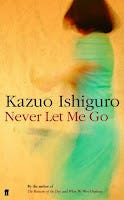Never Let Me Go and the reasons for creating a life

So I thought I’d better start mentioning a few more books that I have been reading. I did just finish Never Let Me Go by Kazuo Ishiguro for a book club I am in. It’s an older book, and it’s too hard to say anything about it without spoiling the plot, so if you intend to read it yourself or want to see the upcoming movie in ignorance, stop now. But, essentially the book is the story of a school full of cloned children, who are being raised to be biological donors for others. They are cared for by “guardians” who give them only the vaguest information about why they are there, so the story follows the growing awareness of the children of the purpose of their lives. As they get older it’s terribly sad of course, but also curious how, having been raised on an idea, the children mostly come to just accept it as the way things are and as their reason for existing.
I thought Ishiguro did an amazing job of capturing the way children come to understand their world, and invent their own explanations for what goes on around them (for example, I loved it that they thought Norfolk County was where lost things went), and of writing a kind of ‘stream of consciousness’ as the girl who narrates the story goes back through her childhood to make sense of her life, though the actual writing style didn’t overly captivate me. Ishiguro dabbles in all genres of writing, so I’d like to read some of his other works.
Anyway, obviously Never Let Me Go is exploring, along the way, what it actually is to be human, using what might seem to be an extreme scenario to do so. But when I read this post by Nicole yesterday, I realised that it is just not so far-fetched anymore. It seems to me that the ethics of deliberately creating excess embryos to be destroyed for research is not so far from that of raising children to be (fatal) donors. Horrible.

